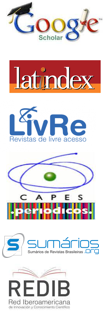Evolução dos Termos Objetos de Aprendizagem, Ferramentas Digitais e Recursos Educacionais Digitais na Educação Brasileira: Análise de Teses e Dissertações (2015-2023)
DOI:
https://doi.org/10.17921/2447-8733.2024v25n4p798-802Resumo
Este estudo explora a evolução dos conceitos de "objetos de aprendizagem", "ferramentas digitais" e "recursos educacionais digitais" em teses e dissertações brasileiras, visando identificar tendências e mudanças no uso desses termos no contexto educacional. A metodologia utilizada foi exploratório-descritiva, combinando análises quantitativas e qualitativas. Os dados foram coletados no Portal de Teses e Dissertações da Capes, abrangendo o período de 2015 a 2023. A análise revela um declínio no uso de "objetos de aprendizagem" e um aumento significativo na adoção de "ferramentas digitais" e "recursos educacionais digitais". Esses resultados indicam uma adaptação contínua às novas tecnologias e uma evolução nas práticas pedagógicas, refletindo a substituição gradual de conceitos antigos por novos que englobam tecnologias mais avançadas. A correlação inversa entre "objetos de aprendizagem" e "ferramentas digitais" sugere uma transformação na terminologia, enquanto a correlação positiva entre "ferramentas digitais" e "recursos educacionais digitais" demonstra uma crescente consonância e importância desses elementos na criação de ambientes de aprendizagem mais interativos e dinâmicos. A pesquisa destaca a necessidade de práticas educacionais mais inovadoras e adaptativas, bem como as mudanças na área da pesquisa que se aprimora constantemente, visto na mudança do uso dos termos.
Palavras-chave: Objetos de Aprendizagem. Ferramentas Digitais. Recursos Educacionais Digitais. Tendências Pedagógicas. Tecnologia Educacional.
Abstract
This study explores the evolution of the concepts "learning objects," "digital tools," and "digital educational resources" in Brazilian theses and dissertations, aiming to identify trends and changes in the use of these terms within the educational context. The methodology employed was exploratory-descriptive, combining quantitative and qualitative analyses. Data were collected from the Capes Thesis and Dissertation Portal, covering the period from 2015 to 2023. The analysis reveals a decline in the use of "learning objects" and a significant increase in the adoption of "digital tools" and "digital educational resources." These results indicate a continuous adaptation to new technologies and an evolution in pedagogical practices, reflecting the gradual replacement of older concepts by new ones that encompass more advanced technologies. The inverse correlation between "learning objects" and "digital tools" suggests a transformation in terminology, while the positive correlation between "digital tools" and "digital educational resources" demonstrates a growing alignment and importance of these elements in creating more interactive and dynamic learning environments. The research highlights the need for more innovative and adaptive educational practices, as well as the changes in the research field that are constantly improving, as seen in the shift in term usage.
Keywords: Learning Objects. Digital Tools. Digital Educational Resources. Pedagogical Trends. Educational Technology.
Downloads
Publicado
Como Citar
Edição
Seção
Licença
Copyright (c) 2025 Revista de Ensino, Educação e Ciências Humanas

Este trabalho está licenciado sob uma licença Creative Commons Attribution-NonCommercial-NoDerivatives 4.0 International License.



